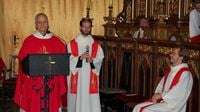As the newly elected Pope Leon XIV prepares to unveil his vision for the Church, many are reflecting on the legacy of his predecessor, Pope Leo XIII, who reigned from February 20, 1878, to July 20, 1903. Often hailed as the first modern pope and the father of the Church's social teaching, Leo XIII's influence remains significant in today's discussions about the role of the Church in society.
Pope Leo XIII is perhaps best known for his encyclical, Rerum novarum, published in 1891. This groundbreaking document addressed the social and economic changes of the late 19th century, particularly in response to the rise of Marxist and liberal-capitalist ideologies. It emphasized the necessity of cooperation between the Church and the state, outlined a Christian vision of human dignity, and stressed the Church's obligation to care for the working class. Leo XIII's teachings on social issues were prolific, resulting in a remarkable 86 encyclicals during his pontificate.
One of his most notable contributions was the establishment of the Pontifical Biblical Commission, which aimed to promote biblical studies and scholarship. This initiative was part of his broader effort to engage with contemporary issues and encourage a more informed understanding of faith among the laity and clergy alike.
During his time as pope, Leo XIII also made strides in international relations, notably establishing the first diplomatic ties between the Holy See and the United States. This marked a significant step in the Vatican's global engagement, allowing for greater dialogue and cooperation with a rapidly growing nation.
In a move that reflected his commitment to transparency and scholarship, Leo XIII opened the Vatican Secret Archives, granting access to researchers and historians regardless of their religious affiliations. This unprecedented decision has allowed scholars to explore the Church's history more deeply, fostering a greater understanding of its role in global events.
In 1886, Leo XIII composed the famous Prayer to St. Michael the Archangel, which he mandated to be recited at the end of every Mass. This prayer has since become a staple in Catholic worship, emphasizing the Church's reliance on divine protection against evil.
As Pope Leon XIV takes on his new role, many are left wondering whether he will continue the teachings and principles established by Leo XIII. The echoes of Leo XIII's thoughts are particularly relevant today as society grapples with issues of social justice, economic disparity, and the relationship between faith and public life.
Reflecting on the teachings of Leo XIII, one can find numerous insights that remain pertinent. For instance, he stated, "If the legislators and rulers were to command or introduce something that contradicts divine or natural law, the dignity and duty of the Christian name, as well as the apostolic teachings, recommend that we should listen to God rather than men" (Encyclical Quod apostolici muneris). This assertion highlights the Church's stance on moral integrity and the importance of adhering to divine principles in governance.
In his encyclical Exeunte iam anno, he emphasized the need for Christians to resist the corrupting influences of the age, stating, "The essence and principle of the whole Christian life is not to yield to the corrupt customs of the age, but to constantly oppose and fight against them." This call to action resonates with contemporary believers who seek to navigate the complexities of modern society while remaining faithful to their convictions.
Leo XIII also warned against diluting doctrinal truths, asserting, "They believe that in order to win the hearts of those who stray, it is beneficial to present certain points of doctrine as less important or to soften their meaning to such an extent that they are no longer understood in the sense that the Church has always adhered to" (Encyclical Testem benevolentiae). This caution serves as a reminder of the dangers of compromising core beliefs in the pursuit of popularity or acceptance.
Furthermore, he articulated the relationship between the Church and the state in his encyclical Immortale Dei, stating that both have distinct spheres of influence, with the Church overseeing spiritual matters and the state governing temporal affairs. He argued, "Each is sovereign in its own kind; each has certain well-defined boundaries established according to its nature and particular purpose." This delineation remains a critical discussion point in the ongoing dialogue about the role of religion in public life.
Leo XIII's teachings also underscored the importance of religious freedom, cautioning against coercion in matters of faith. He stated, "The Church is very careful that no one is forced against their will to embrace the Catholic faith, for, as St. Augustine wisely notes, 'a person can only believe voluntarily.'" This principle of voluntary belief is foundational to the Church's approach to evangelization and interfaith dialogue.
Moreover, he firmly believed that public authorities must not act as if God did not exist, nor should they dismiss the importance of religion. He emphasized that those in power should adopt the way of worship that God has revealed as the proper means of honoring Him.
As discussions around the Church's role in society continue, the teachings of Pope Leo XIII provide a rich tapestry of insights that may guide Pope Leon XIV in his papacy. His legacy serves not only as a historical reference but also as a source of inspiration for navigating the challenges of modernity.
With the world watching, the question remains: will Pope Leon XIV embrace the principles laid down by Leo XIII and carry forth the torch of social teaching, or will he chart a new course? Only time will tell, but the teachings of Leo XIII will undoubtedly continue to resonate, reminding the faithful of their enduring relevance.




